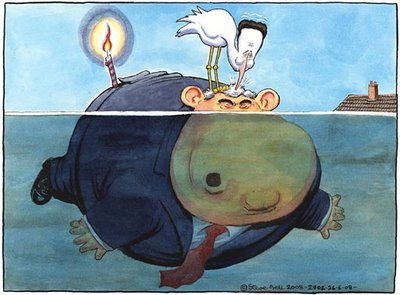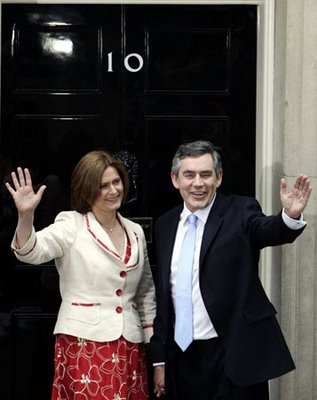One year on: the verdict.
 Predictably, the week's press has been full of various articles commenting on Gordon Brown's anniversary in power, so there seems little point in writing a long narrative along similar lines (although, as usual, it seems that's what I've ended up doing) when you can go with either of these two instead.
Predictably, the week's press has been full of various articles commenting on Gordon Brown's anniversary in power, so there seems little point in writing a long narrative along similar lines (although, as usual, it seems that's what I've ended up doing) when you can go with either of these two instead.It is however worth looking back, if it isn't too narcissistic, at what I wrote when Gordon ascended and what would hopefully be changed or altered. As you might have guessed, it doesn't make for good reading:
It's probably worth a slight cheer that the dross is getting cleaned out, although we won't have the full details of Brown's new cabinet until tomorrow. Patricia Hewitt and Margaret Beckett, united in being completely out of their depth in their respective jobs, are at least finally put out of their misery. John "not a single shot" Reid has already announced his departure, as has Lord Goldsmith and another Blairite apparatchik, Hilary Armstrong. If Hazel Blears, Tessa Jowell, Lord Falconer, Lord Drayson and Liam Byrne follow suit then Brown might just mean a certain amount of what he says.
Hazel Blears is now communities minister, and as useless as ever. Tessa Jowell is still Olympics minister, because you may as well keep one complete failure at the post rather than taint someone else with such a poisoned chalice. Lord Falconer has gone, and since taken to criticising Brown over 42 days and the constitutional changes, even though if he were still in government he'd doubtless be defending the same things to the hilt. Lord Drayson resigned to spend more time racing, and Liam Byrne is still at the Home Office. Adding to the dross that Brown has brought in, "Wacky" Jacqui Smith is just as bad a home secretary as we've come to expect from New Labour, Tony McNulty, is still polluting the airwaves with his absolute loyalty to the Supreme Leader and every bad policy which has ever been conjured up, Andy Burnham is now culture secretary, the execrable Blairite James Purnell is at work and pensions, and the supremely talented Digby Jones was last week celebrating the brilliance of the British arms industry as trade minister. With a team like that, how can it be possible that Labour's doing so badly?
He should be similarly judged on just how far his familiar talk of a new politics is. It needs to involve a full, independent inquiry into the Iraq war - involving both how the intelligence was presented by the government in the build up to war, how apparently the planning for after the invasion was either ripped up and ignored or how there was none in the first place, and as Lord Goldsmith has already suggested, how the mistreatment and torture of detainees came to be both accepted and even encouraged, with predictable results. A similar inquiry into the 7/7 attacks wouldn't go amiss either.
Back in March the government argued successfully again that the "time wasn't right" for an inquiry into the war. There is also no chance whatsoever of an independent inquiry into 7/7.
Next Brown needs to set out just how soon the troops in Iraq are to be brought back - they are, as General Dannatt said, simply making the security situation in the south worse. Enough blood has been spilt, both Iraqi and British. Handover in the other provinces formerly controlled by the British has already taken place with only minor problems. The majority of troops could be back home within 3 months, with a complete withdrawal within a year easily being achievable.
Since then, the withdrawal to Basra airport has taken place and there have been no casualties in Iraq for some time. One of Brown's biggest mistakes was his trip to Basra during the Conservative party conference last October, quickly seized upon as him trying to make political capital out of bringing troops home while deflecting attention from the Tories. The opposition also quickly noticed that Brown's announcement was another New Labour classic strategy of re-announcing something already made public. The troops are still stuck in Iraq, serving absolutely no purpose whatsoever except making things easier for the Republicans in an electoral year. That Brown and Bush were far more chummy when he came to visit two weeks' back than at the initial meeting, where Brown was deliberately stand-offish to give the impression that the special relationship between Blair and Bush was not going to be continued showed where the real power lies.
Reid and Brown have already hinted at a new attempt at reaching cross-party consensus over anti-terror legislation. The introduction of intercept evidence, rejected so far, needs to be reconsidered, despite the concerns of the security services. The disappearance of those being held under control orders has only proved what the critics said they would be: both illiberal and ineffective. Rather than derogating from the article 5 of the ECHR, those being held under them should be either prosecuted or set free, it's that simple. Brown is meant to support up to 90 days detention without trial: he could signal a new approach to civil liberties by deciding that 28 days is in fact more than enough, especially combined with offences not yet used that make it illegal to withhold encryption keys. Putting into action the leak at the weekend of the possibility of the lifting of the protest ban within a mile of parliament should also be one of his first acts in office. Scrapping ID cards and reexamining the need for both the children's database and "the Spine" medical records database, indeed the whole National Programme for IT would also be more than welcome.
Starting with the good, Brown is indeed scrapping the ban on protests within a mile of parliament without permission. That he last week claimed this was a freedom that Labour had created when it was one that they had initially taken somewhat blotted the goodwill the gesture originally espoused. As for the rest, I think we all know what happened over 42 days, without needing to go into it yet again. Intercept evidence is still rejected; control orders are still in place; ID cards the same; the children's database and the Spine are still coming; and the National Programme for IT is still the wasteful disaster it was at the time of writing.
Columnists have talked of Brown wanting to make considerable constitutional changes, even as potentially radical as either a bill of rights or an actual constitution. If we're to have either, then the bollocks about "rights and responsibilities" has to be dropped. We have rights: we don't need to be reminded of our responsibilities while exercising them, especially in any document, which is the way the ludicrous debate has been going. Potential electoral reform, also hinted at, would also be welcome. Almost every other election going is now under a form of proportional representation, whether it be for the European parliament or the Scottish/Welsh votes, so let's at the very least have the alternative vote system at Westminster, if not full PR.
Far from the bollocks about "rights and responsibilities" being dropped, it's instead at the very heart of the mostly miserable constitutional changes planned. Electoral reform was briefly alluded to, with the alternative vote mooted, but again it seems to have now been forgotten.
This is without even going into the NHS or further education reform, on which Brown's ideas/plans have also not looked particularly promising. If he means what he says, then full consultation, rather than top-down enforced for the sake of it change must be the order of the day. There's next to no chance that he'll reconsider the huge wastefulness of his pet PFI projects, especially considering how they've helped keep him from breaking his so-called "golden rule" by keeping the costs off the public balance sheet, but it's a scandal waiting to happen, and he ought to act first.
On schools, we've seen the academy system being ever further hyped up, ignoring the inherent problems they have with the sponsors, the more subtle forms of selection, and the throwing of the "troublesome" children onto the other schools. Ed Balls, who despite the brickbats aimed at him by the right is one of the most promising ministers mainly because he stills seems to have an ounce of humanity left in him, recently announced that over 270 schools were for the chop if they didn't improve within 2 years. That a large proportion of these schools aren't failing in the specific sense doesn't seem to matter; we must have permanent revolution in education or we have nothing. On health, while Alan Johnson has mostly been an effective minister, the planned polyclinics are rightly attracting huge amounts of criticism and concern about the patient-GP relationship being broken down. Health is probably the government's biggest success since Brown's takeover: the losses have been turned into surpluses, waiting times are down across the board, but no one really seems to have noticed.
There's much much more, on criminal justice, immigration and the environment which could be discussed, but this ought to be a more than adequate basis on which his promises to be different should be eventually considered. An election sooner rather than later would also be a welcome step, if he's to firmly cement his mandate which not even Labour party members were called on to confirm. A year should be more than enough time to consider whether he's been true to his word. If so, rejoicing then might be in order. I'm not holding my breath.
The only really appreciable change over criminal justice policy was that quietly the reliance on ASBOs has been dropped, with Ed Balls again being fingered as the person responsible, with him wanting a return to a more welfare based approach. That is to be welcomed, but when your entire policy revolves around responding to whichever tabloid demands this or that on crime this week, it's constantly being undermined. The reclassification of cannabis to Class B is the prime example - a move that will simply criminalise yet more young people and those who have been smoking for years, distract the police from dealing with more serious crimes, and will have no effect whatsoever on those who'll carry on using the drug regardless, all because of one of the most hysterical and misinformed tabloid campaigns on "skunk" in years. Again, we all know what happened on the election front, and ever since we've been treated to constant, tedious allusions and remarks about "bottler" Brown.
When Brown became prime minister, I suspect many of us on the left hoped that Brown, while never likely or even able in the circumstances to reach the standard we'd like to set, would at least offer something different to Blair. In a way, he has. The spin has calmed down, we haven't had any outrages on the level of that day in December 06 when Blair was questioned by police while everything possible to distract from it was enacted, or the shameful response to the Israel/Hizbullah/Lebanon war. Brown is infinitely more of a real person that the messianic Blair, but yet it seems the public themselves don't want someone more cerebral, less natural in front of a camera, less charismatic. You look across at David Cameron, and it seems that is what a significant majority now seem to want from their leader: folksy, personable, the common touch while not being the slightest bit common. Brown of course doesn't help by the way he responds to the ribbing of Cameron at every prime minister's questions, the prime minister resembling the proverbial bear with a sore head, who roars at every jab while never landing a blow. In that, Vince Cable was wrong: Brown is Stalin, but he's only feared by his own people, in this case the Labour party itself. Everyone outside of it just pokes endless fun at him.
This difference though doesn't make up for the complete lack of change for those of us who are sympathetic, while it's disastrous for him and Labour among those who aren't. The overwhelming reason why Labour is 20 points behind in the polls isn't for any of the above reasons however, but because the economy has finally turned, and the cupboards are bare. The 10p tax debacle just reinforced that even the two things Brown was meant to be for, the end of child poverty and stealthy redistribution to the poorest, were dispensable when an opportunity to get one over on the Tories presented itself. So it was over 42 days.
The most damning verdict on Brown's first year in power has been given most forcibly not by any commentator or blogger, but by the voters in the Henley by-election. Labour was never going to win, but to come fifth behind both the BNP and the Greens and to lose your deposit could not be a bigger indictment. The hilarious solution to this from Hopi Sen is to donate money to the party, which contains the same amount of logic as putting your money on a horse with three legs. Most of all though, Brown has not just betrayed those who hoped for better things, he's betrayed himself. Blair never had any principles to jettison, and it was clear from the beginning he would say or do anything to get into power. The same is apparent with David Cameron. We thought differently with Gordon Brown, but we were wrong. There's no point changing leader, as no one can stop the ship from sinking. All that's left is to count the days until these bastards are finally out of power and the next set of likely worse bastards are voted in.
Labels: death of Labour, Gordon Brown, Gordon Brown one year on, handover of power, New Labour, politcs



